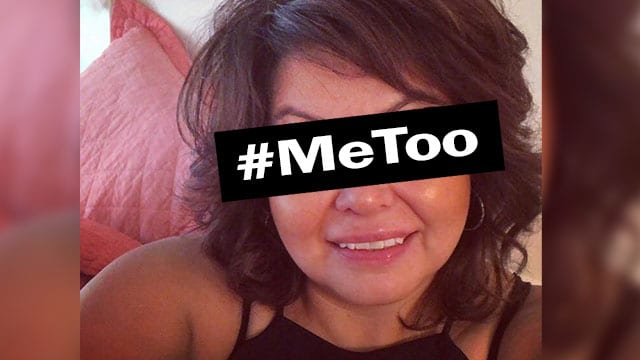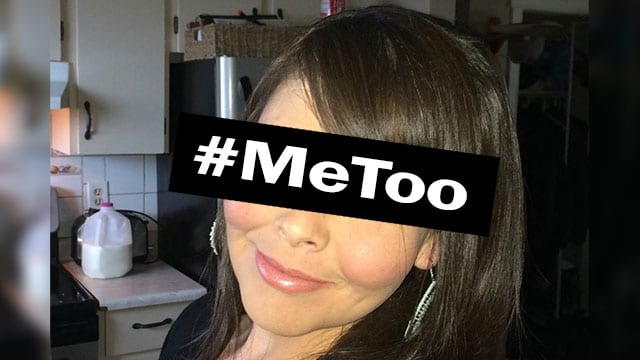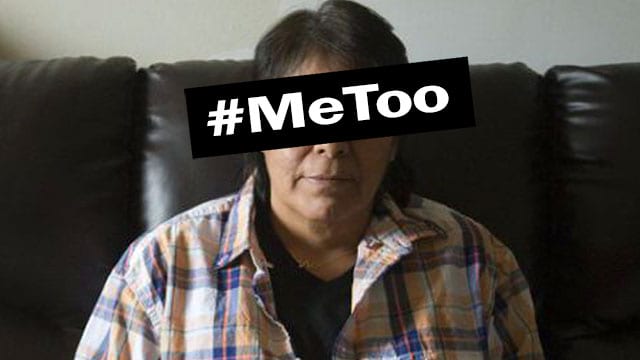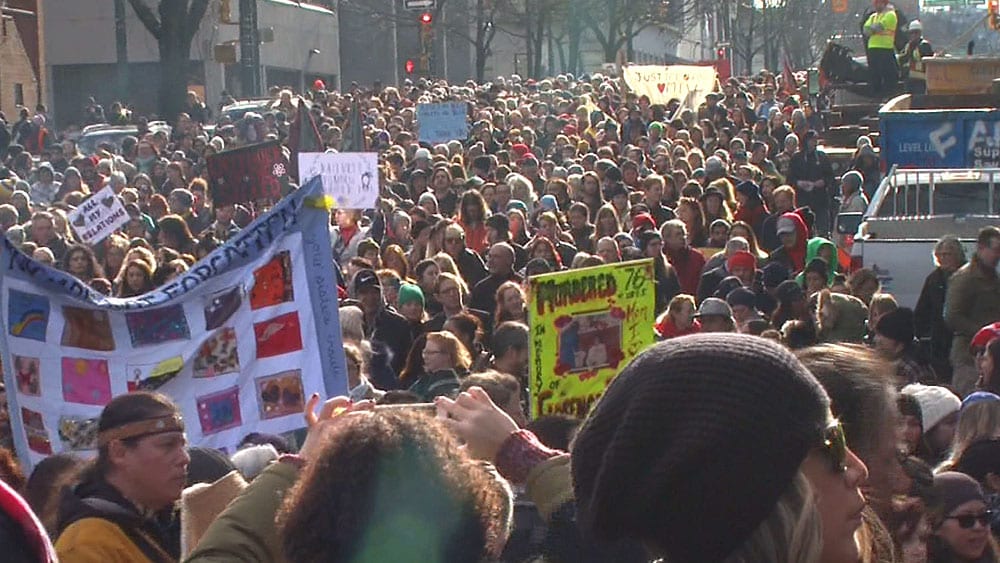
Melanie Hart charged a former chief with assault.
(Melanie Hart charged a former First Nation chief with assault)
Women around the world are calling #TimesUp on violence and abuse but not as many are saying #MeToo in Indian Country.
At least not publicly.
Melanie Hart of Manitoba says there’s a good reason for that.
“We, as Indigenous women, we tell our stories. We go to court. We do everything that we’re supposed to do,” she said.
“With no justice. None.”
Hart could be forgiven for sounding bitter.
She took then-partner, Wallace Fox, former chief of Onion Lake First Nation in Saskatchewan, to court for an act of domestic violence she alleged occurred in 2016.
Fox received a peace bond that prevents him from contacting her.
“I was so disgusted,” Hart said in an interview.
“Why did they even give me the offer of going over there and testifying if that’s what going to happen anyway? Put me through all that hell.”
Hart was forced to travel to Onion Lake, which straddles the Alberta border, to testify in court. Fox had been chief there for 30 years and declined to comment when APTN reached him via phone.
His punishment was tougher in 2015 when he admitted hurting an earlier partner, Vicki Monague of Ontario.
“Wallace actually pled guilty to a lesser charge, so he made a plea bargain,” Monague said.
“At first, he had pled not guilty and then he changed his plea.”
The sentence was 12 months probation with conditions to keep the peace and be of good behaviour.
“I know a lot of men in First Nations politics,” said Monague,” and I know a lot of them, they have a lot of healing that they need to do on themselves to be good leaders, with respect to the #MeToo Movement.”

(Vicki Monague says she was the victim of domestic assault)
The chiefs of Canada’s 634 First Nations are mostly male.
This week they select a new national chief for their lobby group, the Assembly of First Nations (AFN), for a term of three years.
They have never elected a female candidate, although two women from Manitoba – Sheila North and Katherine Whitecloud – are vying to be the first during this race.
Whoever is crowned will be expected to address issues of violence as the #MeToo Movement grows.
The Twitter hashtag emerged online near the end of 2017 to identify sexual harassment, abuse and assault. It helped victims bring down major players in the areas of business, politics and entertainment.
It has even emerged during testimony at Canada’s National Inquiry into Missing and Murdered Indigenous Women and Girls (MMIWG) after two high-profile women used the arena to out their abusers.
Both Inuk singer Susan Aglukark and Vancouver MMIWG advocate Bernie Williams encouraged more Indigenous women to “share their truths.”
But Hart says it’s not easy.
“The community can turn against you,” she warned.
“People at court were afraid to look at me or say Hi to me…because they were afraid of him. That’s their leader.”
A chief has power over people in a way unmatched in non-Indigenous communities.
“A chief can take away your house, your job. He can cut you off of everything,” said Hart, who hopes the #MeToo Movement can burst that protective bubble around leaders.
“I felt people believed him because of who he is.”

(Pauline Fair helped convict a former chief of a First Nation in Ontario)
In northwestern Ontario, a former chief pleaded guilty last winter to committing a sex crime in the 1970s.
Eli Mandamin of Shoal Lake 39 was charged with rape and having sex with a minor. The rape charge was withdrawn after he pleaded guilty to sexual intercourse with a female between 14 and 16 years.
Victim Pauline Fair waived a publication ban on her name.
“The case…is a really huge victory for me,” she said in an interview.
“It would take a dozen women to bring down a guy like that. And I brought him down by myself.”
Fair was 14 when she says Mandamin – then a special constable with the Ontario Provincial Police – took her into custody. She says something caused her to black out and she came to with him on top of her.
Fair became pregnant and gave birth to a son, which kept her from reporting the crime for decades.
“I was protecting him,” she said, noting her son died a few years ago.
“That’s why I didn’t come forward before.”
Mandamin is expected to be sentenced this fall. His lawyer, Robin Parker, didn’t respond when asked for a comment for this story.
But Fair says she wouldn’t have been able to seek justice if she still lived in the community.
“I feel some safety being out of there,” she said.
“I don’t think anyone would be mad at me for doing this except for maybe his family.”

(The #mmiwg and #metoo movements are starting to come together.)
Monague likes what the #MeToo Movement is trying to accomplish.
But she has a theory on why it’s not being used widely by Indigenous peoples.
“Because for us, as First Nations people, we’re focused on healing,” she said. “We’re not focused on vilifying,”
She’s honest that it took a while for her to reach that conclusion as a part of healing from her relationship.
“When I’m thinking about my case with Wallace nobody wins in this,” she added. “And nobody wins in the #MeToo Movement.
“I find that it’s more about exposing people as being villainous but it’s not about getting to the root causes of what is causing the behaviour.”
Monague would like to see an Indigenous #MeToo promote healing and wellness. Not just for women but also for men.
“Leaders and First Nations men across the country need to start addressing the historical traumatic issues that they’re carrying,” she said, “that unfortunately are affecting their leadership.”










metoo considering specifically the rights of indigenous people, is often in solidarity with water protectors.
Water is life, including women’s health. We will protect it in freedom and help each other. It will be a successful strategy for as long as the rivers flow.
I’m also trying to keep my family safe, we’re still here.
metoo considering specifically the rights of indigenous people, is often in solidarity with water protectors.
Water is life, including women’s health. We will protect it in freedom and help each other. It will be a successful strategy for as long as the rivers flow.
I’m also trying to keep my family safe, we’re still here.
Well done. The most important comments come from Ms Monague. We need to use this moment and this information to promote wellness and healing. Sexual exploitation, and the rage and shame associated, is a scourge that has plagued humanity long enough. It doesn’t discriminate, but it harms children the most. It prevents boys from becoming the men they were meant to be, and girls from becoming the women they were meant to be. Our institutions are built upon protecting and proliferating it. Once we, as a human race, unite around protecting children from its ravages, heal those that are wounded but reparable, and identify those whose souls have been completely lost to its toxicity (for they are the greatest threat to the well-being of all children) our children will all be able to grow to reach their greatest potential and this earth will be protected. #NoChildIsSafeUntilEveryChildIsSafe
Very well said!
Well done. The most important comments come from Ms Monague. We need to use this moment and this information to promote wellness and healing. Sexual exploitation, and the rage and shame associated, is a scourge that has plagued humanity long enough. It doesn’t discriminate, but it harms children the most. It prevents boys from becoming the men they were meant to be, and girls from becoming the women they were meant to be. Our institutions are built upon protecting and proliferating it. Once we, as a human race, unite around protecting children from its ravages, heal those that are wounded but reparable, and identify those whose souls have been completely lost to its toxicity (for they are the greatest threat to the well-being of all children) our children will all be able to grow to reach their greatest potential and this earth will be protected. #NoChildIsSafeUntilEveryChildIsSafe
Very well said!